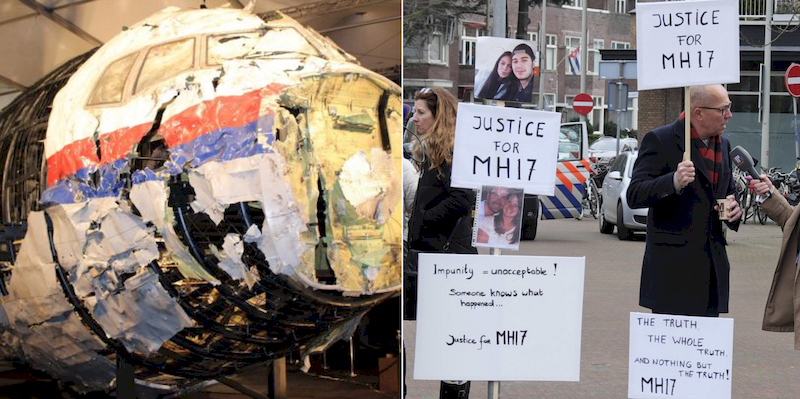Next step the Hague after Russian military source named for Buk missile that downed MH17

For the families of the 298 people killed by the downing of MH17 on 17 July 2014, the findings announced on 24 May 2018 were important but still far from bringing the individuals responsible to justice. For the purposes of both one current case before the UN International Court of Justice and future cases at the International Criminal Court, the Joint Investigation Team’s conclusions could not have been of greater significance.
The Joint Investigation Team [JIT] has concluded after painstaking study of all evidence that “the Buk missile which downed Malaysian airliner MH17 on 17 July 2014 came from the 53rd Anti-Aircraft Missile brigade which is a unit of the Russian army from Kursk in the Russian Federation”.
JIT had already stated back in September 2016 that the Buk missile which downed Malaysian airliner MH17 over militant-controlled territory in Ukraine came from Russia. It has now, however, clearly identified its source as directly linked with the Russian Armed Forces and says that the combination of features it studied to reach its conclusion are “so special that that can be considered as a fingerprint”.
Lana Zerkal, Ukraine’s representative in its case against Russia at the International Court of Justice at the Hague commented that the JIT conclusion made it patently clear to everybody why Russia had used its power of veto in the UN Security Council to block an international investigation into the disaster. She goes on to say that even this cannot help either the individuals directly responsible or the state which provided them with such a powerful weapon to avoid liability.
Russia has consistently pushed the line that any Russians found fighting in Donbas are ‘volunteers’, and has used a combination of repressive measures, threats and bribes to avoid information about soldiers fighting and / or killed in Donbas.
If a Buk missile carrier belonging to the 53rd Brigade had been stolen by criminals, there would have been no reason for Russia to ignore the questions put by JIT.
As Zerkal notes, the identification of the Buk missile carrier with a unit of the Russian Armed Services is direct proof of Russia’s supply of weapons used to down a civilian airliner. This is a violation of the 1971 Montreal Convention and the International Convention for the Suppression of the Financing of Terrorism .
The latter is of particular importance given the case brought by Ukraine against Russia at the UN’s International Court of Justice [ICJ] at the Hague. Ukraine has accused Russia of violating two UN conventions – the above on financing terrorism, and the International Convention on the Elimination of All Forms of Racial Discrimination.
It is clear that Russia is aware that the supply of any military equipment is incriminating. There were some extraordinary claims during the preliminary hearings before the Court in the Hague in March 2017, with one Russian representative claiming that the weapons possessed by the Russian-backed militants had come from Soviet stockpiles in Donbas mines.
Ukraine is due to present its detailed submission backing its claim to the Court on 12 June.
The JIT investigators made it quite clear during their presentation of the findings on 24 May that they have further evidence, which it will be for courts examining charges against those believed liable to consider. The findings made public are already damning enough and many commentators on Thursday felt that they were a further step towards Russia or specific individuals ending up before the International Criminal Court at the Hague.
In December 2016 the Chief Prosecutor concluded in her report that Russia’s occupation of Crimea constitutes an international armed conflict, which therefore falls within the ICC’s jurisdiction. The situation in Eastern Ukraine was seen both in that and the 2017 reports as more complex, given elements of a non-international armed conflict.
The Office of the Prosecutor was said to be assessing whether the information available provides evidence of “support for the armed groups to the armed groups in the form of equipment, financing and personnel, and also whether they have generally directed or helped in planning actions of the armed groups in a manner that indicates they exercised genuine control over them.”
The supply of the Buk missile by the Russian Armed Forces is surely of direct relevance here.
The importance of such findings cannot be overstated even though it is likely that those most directly responsible will never stand trial. Russia does not extradite its own citizens, and the UK’s attempt to have Alexei Lugovoi, believed to have poisoned former FSB agent Alexander Litvinenko with radioactive polonium in 2016 resulted in Lugovoi’s appointment to Russia’s State Duma (parliament). Russia also recently protected the Ukrainian militant torturer and murderer of a 16-year-old pro-Ukrainian schoolboy.
Any proceedings in international courts will take a long time. In the shorter term, there is agreement between the member countries of the Joint Investigation Team (Australia; Belgium; Malaysia; the Netherlands and Ukraine) that court proceedings against the suspected victims would take place within the Dutch judicial system. Serhiy Petukhov, the Deputy Justice Minister says that such proceedings will i) make it possible to identify those in the Russian leadership responsible for downing MH17 and ii) provide important evidence for the above-mentioned proceedings at the International Court of Justice, as well as for cases before the European Court of Human Rights. They should serve to consolidate and intensify international sanctions against Russia since the latter, by failing to cooperate in uncovering the circumstances of a heinous crime over Donbas, is obstructing peaceful regulation of the conflict as per the Minsk Accord. The potential is also there for eventually putting Russia’s leaders including Russian President Vladimir Putin and the Minister of Defence Sergei Shoigu on trial at the International Criminal Court.





